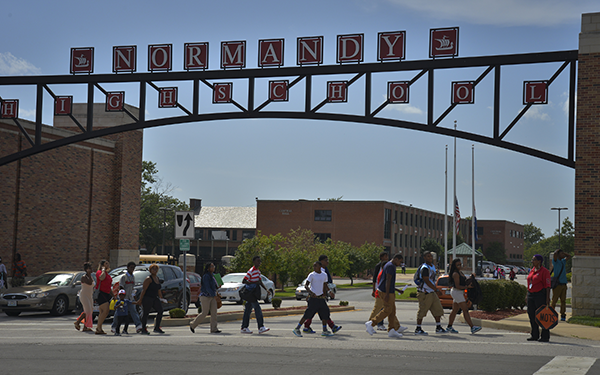Should They Stay or Should They Go: Missouri Families in Michael Brown’s High School Face a Hard Choice

Davis, a single father who makes his living driving a cab, agonized for so long over the persistent physical and emotional abuse his son faced in Normandy Public Schools, the struggling, poverty-ridden district best known for graduating Michael Brown just months before the young man was killed by a white Ferguson police officer.
Back in 2012, when Brown was a sophomore, the state had stripped Normandy of its accreditation because of poor academic performance, and a door opened for the Davises and hundreds of other families to leave their unaccredited district for a higher-performing one. Davis chose Francis Howell High School in St. Charles, betting that a school with a reputation for strong state rankings, not student assaults, would be a safer place for his mildly autistic, biracial son.
And it was, except not long after Robert Davis was settling into Francis Howell, that district and several others in the surrounding suburbs teamed up with the state to fight the law allowing students in unaccredited districts to transfer to better schools. That legal strategy failed in 2014, but the prolonged court battles and the possibility that the state could cut off the transfer option by returning Normandy its accreditation loomed over Paul Davis’ head.
When the start of the 2016-17 school year arrived last week, Normandy remained unaccredited and Robert Davis began his senior year at Francis Howell High School.
“I feel blessed to have turned this corner,” his 65-year-old father said. “This is not an easy world, especially when it comes to education. It depends on what side of the street you live on.”
But the very circumstance that freed Davis — Normandy’s ongoing lack of accreditation and its dismal student outcomes — hurts families that decide to stay in Normandy, like Michael Brown’s did. In the tumultuous years since his death, Brown’s high school has struggled to improve and some say that it has.
James Shuls, an assistant professor at the University of Missouri-St. Louis, argues that the competition between Normandy and other districts might fuel better results for Normandy students across the board.
“Overall, I don't think this is pitting one student against another,” said Shuls, who has authored a study on the effects of the transfer program. “This is expanding options for everyone."
The weight of those options — whether to flee Normandy or remain there and hope the education gets better — is illuminated by Brown, whose death sparked a nationwide movement led by blacks calling for a more just law enforcement system.
A day after the Ferguson shooting, a distraught Lezley McSpadden, grieved both the loss of her son and the bitter waste of his accomplishment — achieved against great odds.
“Do you know how hard it was for me to get him to stay in school and graduate?” she told news station KMOV. "You know how many black men graduate? Not many. Because you bring them down to this type of level where they feel like they don’t got nothing to live for anyway. They are going to try to take me out anyway."
McSpadden, who appeared on stage last month at the Democratic National Convention, further elaborated on those sentiments in her recently released memoir, “Tell the Truth & Shame the Devil: The Life, Legacy and Love of My Son Michael Brown.” The author, who gave birth to Michael when she was 16, calls not graduating from high school,“one of the most uncomfortable and embarrassing facts about my life.”
“Of course, I wanted my high school diploma. I even thought about going to college, but at the time, it was about providing and surviving — and I didn’t know how to do that and finish school. It was a hard choice, but life is hard sometimes, right?… So on May 23, 2014, when Mike received his high school diploma, just a few months before he was gunned down, I was able to live my dream through him.
“Every day is rough for me, but like Maya Angelou said, “Still I rise!” Amen!”
Marjorie Simms knows intimately the value of a high school diploma. Each morning last year inside a three-bedroom red brick house, Simms and her three grandchildren held hands and prayed.
The people they prayed for ran the gamut—from the children’s classroom teachers to the police officers charged with protecting their schools. But mostly, she prayed for her grandkids’ safe passage on the bus that takes them to school through the violence-plagued neighborhood of Pinelawn, Missouri.
“We pray for everyone. We pray for everybody,” the 84-year-old woman said. “We circle up before we go to school and ask our Lord to protect our going out and coming in.”
They are prayers she has seen answered for more than 40 years.
Her oldest daughter graduated from Normandy High School in 1973 and her son followed in 1978. Not all of them made it but in total, five of Simms’ children and one of her granddaughters graduated from Normandy High School and two other grandchildren are now on track to do the same.
She savors that moment when one of her own — dressed in a cap and gown — walks across the stage in the school gym or on the football field and receives his or her diploma.
“They make me remember my own graduation. It brings tears to my eyes,” she said. “There is nothing like it. It’s all in the process of growing up. It means you’re not a little child anymore. You can make your contribution to the society.”
For Simms, getting her children to graduate from high school was not always easy. When she and her family first moved to the area in the late ’60s, they were one of the few black families. Most of the students and teachers at Normandy schools were white, she said.
Once she went to investigate the education being offered at Normandy Junior High after one of her sons told her, “Mom, those teachers are just prejudiced.” As she toured the school and talked with the teachers and staff and saw that no one smiled at her, she realized something was wrong.
“When I came out of that school I was in tears, I said ‘What have we done to our children? We have put our children into an atmosphere where only the fittest could survive,’” she recalled. “‘We have put our children in an unfriendly atmosphere.’”
That thought would come back to her when the time came to chose Normandy or somewhere else for her grandchildren. By then, the Normandy school district had undergone major demographic shifts, transitioning from a mostly white middle class district to a mostly poor black one. Students at Normandy had significantly lower ACT scores, state test scores and graduation rates than the state overall. They were also more likely to be absent from school and face out-of-school suspension than other Missouri students while being less likely to attend a four-year college.
Acting on those grim educational disparities, the Missouri Board of Education voted in 2012 to strip Normandy schools of their accreditation, joining the ranks of the Riverview Gardens and Kansas City school districts. The latter regained its provisional accreditation in 2014.
"It’s just not acceptable to allow our kids, any of our kids, to go through a system that isn’t serving their needs well, that doesn’t expect high performance from them," then-state education Commissioner Chris Nicastro told The St. Louis Dispatch.
The transfer option triggered by the accreditation loss meant not only could students flee Normandy and Riverview Gardens but that those districts had to pay tuition and transportation costs to the receiving districts.
Most Normandy transfers were sent to Francis Howell, where 83.1 percent of the students were white and 19.2 percent qualified for free or reduced-priced lunch, a measure of poverty. At Normandy, 96.5 percent of the students are black and 97.9 percent qualify for school meal assistance.
More than 2,000 students from the two unaccredited school districts transferred into another district during the 2013-14 school year, including 1,083 Normandy students, according to EducationPlus, a non-profit that helped organize the process. That cost Normandy about $1.5 million a month in tuition and transportation expenses, according to The St. Louis Post-Dispatch. The district’s financial situation, never great to begin with, grew even more precarious.
Davis, the single father, can easily tick off the reasons he decided to take his son out of Normandy but bullying is at the top of his list. One Wednesday—eight days into his seventh grade year—a kid shoved a desk into his arm and nobody from the school called him until that Saturday. Another time a student threw Robert’s backpack off the lunchroom table and stole his calculator.
“It was the kind of thing that no one wants to happen to their child,” he said.
Davis’ son was an easy target for two reasons: He was biracial, with a black father and a white mother, and his social skills were limited because of his mild autism.
Other kids experienced far worse violent encounters. In 2013, a Normandy High School student, 15-year-old Marquez Oliver, died after a friend punched him in the chest. His son’s former principal told Davis about how students played the “hit game,” where one kid hits another with the explicit understanding that the victim wouldn’t tell the adults.
“I was horrified,” he said. “I wanted to take my son out of there right then and there but where was I going to take him?”
He’d get that opportunity in 2013 through the transfer law. When Davis drove to Francis Howell for the first time, passing nicer roads and better-looking homes than he was accustomed to seeing, he could tell that this school was going to be different. Even the building itself—a big red brick structure with a well-kept athletic center — seemed to boast of resources beyond Normandy’s reach.
Once there, Davis recounted the bullying his son had experienced to a Francis Howell school administrator who helped him register his son for classes.
“She told me ‘What you told me happened at these previous schools is not going to happen here,’” he said.
Davis said at the time he was hopeful but adopted a “wait and see” attitude. Within months his son started to adjust socially through his membership in the school band, where he plays the clarinet.
“I think what I had to adjust the most to was getting used to not being yelled at all the time,” Robert, 17, said. “I mean the students don’t openly mock me.”
Simms remembers getting phone calls from Missouri education officials about the opportunity to transfer her kids to Francis Howell, but she didn’t think twice about changing districts.
“They were very, very friendly. They sounded very nice. I thanked them and appreciated their warmness,” she said. “I still chose to let my children stay at my Normandy.”
The family gets up around 6 a.m. to get ready for school and Simms thought transferring might have required them to rise even earlier, at 4:30 or 5 a.m. The long trip home might have meant they would have to skip extracurricular activities such as football or baseball. She wonders, now, whether her grandchildren would be well received at the mostly white suburban school district the way her own children were not in Normandy so many years ago.
Reporter Nicole Hannah-Jones in a 2015 “This American Life” series on school segregation focused on the Normandy transfer program. She reported on a meeting at Francis Howell where unhappy white parents talked about the incoming black students driving down scores and increasing violence. One suggested Francis Howell move its start time so early it would be completely inconvenient for Normandy students to get there in the morning.
Simms’ grandson, Antoine Boone, 17, said he thought about wanting to make a switch at first but then something else occurred to him: “My scores can help benefit the accreditation.”
More than 98 percent of Missouri school districts earn at least 70 percent—the minimum required to be considered fully accredited—in the state’s annual school performance review, which includes measures of academic achievement, minority and special education student achievement, high school and college and career readiness, attendance and graduation rates. Last year, Normandy scored a 30.4 on its Annual Performance Report, up from 7.1 percent the year before.
Some of Boone’s friends also stayed at Normandy while others left one to come back in the middle of the semester.
“They were just like … the lessons are different from Normandy’s lessons, like how it was harder,” he recalled his friends telling him. “They had to wake up too early and would fall asleep in class and stuff.”
Simms said the transfer program takes away precious resources from Normandy schools. Besides, she argued, even if the district needs to improve, parents should do their part to help their child take full advantage of their education.
“I think parents should work with the school, with the teachers. They should work together. If just the school is trying to educate your children and the child is (misbehaving), that’s on your end. Then naturally something will fall through the cracks,” she said. “If they work together the children will achieve something.”

In June 2014, the state took over the Normandy school district, appointed a new school board and renamed the district the Normandy Schools Collaborative. Crucially, it did not assign it an accreditation status.
Without that, the state Education Department said Francis Howell could decide whether or not to accept Normandy transfer students. The Francis Howell district subsequently announced it would no longer accept transfer students from outside the region and the Normandy students already there would have to go back.
Soon after, a group of Normandy parents sued, arguing that the state should not have reorganized the Normandy school district without answering the accreditation question.
Meanwhile, Davis was so determined that his son would not return to Normandy that he took drastic action—leaving the three-bedroom house where they had lived for some 15 years and moving to St. Charles County. Now Francis Howell was their neighborhood school but paying rent for a two-bedroom apartment on top of his mortgage seriously strained Davis’ finances.
That August, Michael Brown was fatally shot, prompting prolonged protests in Davis’ old neighborhood. A study released last month found a causal decline in students’ math and reading scores if they attended schools close to the unrest. The primary mechanism driving the drop was chronic absences, which impacted majority-black schools throughout the area.
“It overshadowed everything that was going on in our life,” Davis said.
The following February, a St. Louis county judge ruled in favor of the transfer students, saying that Normandy was not just unaccredited, it was “abysmally unaccredited,” and forcing students to remain there would cause them “irreparable harm.”
The Davises could move back home.
The first year of the state’s takeover of Normandy schools got off to a rocky start, in part because the school system had to launch its 2014-15 hiring process in the summer when many other districts were much further along. About 48 percent of the 2014-15 staff were brand new to the district and many teachers struggled with classroom management, according to the district.
The district also slashed teacher assistants, instructional coaches and some staff in the central office. At the end of that school year, a Post-Dispatch story highlighted numerous problems, including ineffective or uncertified teachers, classroom disruptions and discipline issues. In a particularly damning photo gallery, students are seen sleeping and practicing dance routines during physics class.
Since then, the district has made a number of changes, including reinstating AP and honors classes and creating new career pathways that allow Normandy High School students to take electives in the biosciences, engineering, performing arts or entrepreneurship. They have also partnered with local colleges and universities to allow kids to enroll in dual credit courses. Some of the surrounding suburbs have pitched in to help the district by providing instructional coaches and professional development.
Normandy also created a brand-new kindergarten center, in which teachers concentrate heavily on literacy. Passing reading scores of kindergarteners have increased while suspension rates overall have dropped, according to schools Superintendent Charles Pearson.
To parents who have transferred out of the district, Pearson told The 74 he had this to say:
“Come back and stay a day in one of our buildings … We have done that with some parents and they say ‘OK, this is different,’” he said. “We’re not done yet. We formally say we have a short-term goal of accreditation and a long-term goal of preparing students for the 21st century.”
That’s enough for the Simms’ family. Boone plans to go to college and will be taking honors classes this year as well as working in an internship program at a health care company. Boone said over the last two years he’s noticed a change in the school’s culture, with fewer fights and more kids showing up to class.
“They offered me a lot of opportunities,” he said of the high school. “Despite what other people are saying, it is a good school.”
And that’s what worries Davis. At a public meeting this past spring, the single dad implored state officials not to shut down the transfer program or at the very at least, let his son stay for the duration of his high school career.
The good news he received that day was a blow to Normandy.
“I was told Normandy wasn’t going to be reaccredited any time soon,” Davis said. “My son is probably going to graduate from Francis Howell.”
Get stories like these delivered straight to your inbox. Sign up for The 74 Newsletter

;)
